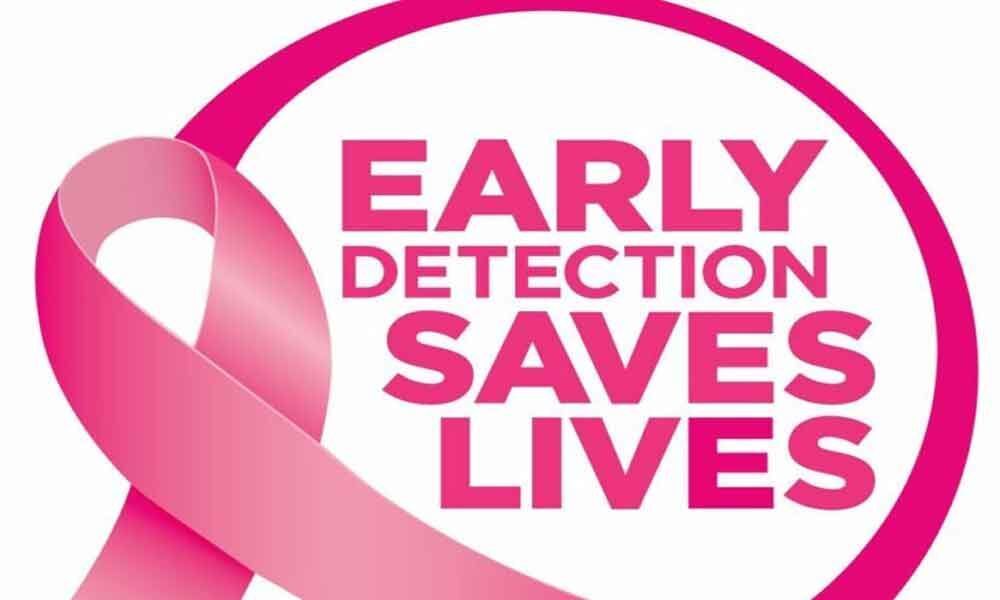Awareness, early detection key to breast cancer prevention

First, the alarming finding to stress the importance of following proven ways to curb incidence of cancers in India. According to Indian Council of Medical Research (ICMR) statistics, over 12 lakh new cases of cancers are diagnosed and over 8 lakh succumb to cancer every year.
First, the alarming finding to stress the importance of following proven ways to curb incidence of cancers in India. According to Indian Council of Medical Research (ICMR) statistics, over 12 lakh new cases of cancers are diagnosed and over 8 lakh succumb to cancer every year.
Mortality due to breast cancer in India
The incidence of breast cancer has overtaken cervical cancer to become the most common cancer affecting women in India. Well over 1,50,000 new cases of breast cancer are diagnosed each year in the country. What is more alarming is that breast cancer is being increasingly diagnosed at a younger age (a decade earlier) in India compared to the West (peak incidence in India is between 40-50 years).
Owing to lack of awareness and absence of an organized nationwide population-based screening programme, more than 60% of breast cancers in India are present in advanced stages, and as a consequence, a majority of women succumb to the disease within a year of being diagnosed. Tragically, a woman loses her life to breast cancer every 10 minutes in India. Due to absence of a robust cancer registry in the country, the incidence and mortality figures are not accurate. These figures are just the "tip of the iceberg."
Can cancer be cured/reversed?
Cancer can't be reversed. One can't use the word "cure" loosely in cancer treatment. It can be effectively treated when presented in early stages, which translates to long-term survival. When a lady is detected with an impalpable breast cancer on screening mammogram many years before the lady or doctor can feel the lump, then, with effective treatment, one can be reasonably sure that such a patient would have excellent long-term prognosis and that she would succumb to old age, and not cancer.
But with more than 60% of patients in India presenting in advanced stages, cure or long-term survival in such patients is a distant reality.
Reduce mortality from breast cancers in India
If valuable lives are to be saved from the breast cancer 'tsunami' in India, there is an urgent need to focus on two vital issues: Create awareness about importance of early detection; and, Implement a population-based breast cancer screening programme
As more than 70% of our population live in rural India, women from the marginalised communities must be sensitised on importance of early detection of breast cancer in addition to being screened to detect breast cancer in the early stages, the two essential tools to save scores of lives.
Best proven way
Although introduction of an organised population-based Breast Screening Programme using Mammography is the best proven way of detecting cancers in the impalpable stage, it is not a viable option in India in the community setting due to the enormous costs involved, huge variation in Mammographic reporting and quality assurance issues.
Clinical Breast Examination (CBE), where trained healthcare workers examine the breasts of women, is relatively simple and inexpensive screening method. There is considerable circumstantial evidence to demonstrate that CBE is a practical and pragmatic screening tool for a country like India. Detecting breast cancers when they are small would also undoubtedly help reduce death rate from this disease. More importantly, CBE presents an excellent opportunity for healthcare providers to educate women in the community about the importance of early detection of breast cancer.
'Indian solution' for early detection of breast cancer
Over the past 12 years, Ushalakshmi Breast Cancer Foundation (UBF), a not-for-profit breast cancer charity, has been championing a major breast cancer awareness drive in Telangana and Andhra Pradesh in an earnest endeavor to transform breast cancer from being a "taboo issue" / a "closet" issue to a much commonly discussed one. This major Pink Ribbon campaign over the past decade through a number of innovative initiatives has indeed been successful in creating the much-needed awareness about importance of early detection in the community both in urban and rural areas, which has attracted national and international appreciation.
AP, TS show way forward
Furthermore, between 2012 and 2017, the Foundation in partnership with Governments of Telangana and Andhra Pradesh has worked with missionary zeal to implement South Asia's largest population-based Breast Cancer Screening Programme by way of Clinical Breast Examination (CBE) in the southern Indian States of Telangana and Andhra Pradesh.
Well over 2,00,000 underprivileged women between the ages of 35 and 65 years spread across 15 districts in 4,000 villages in the Telugu States have been screened for signs of early breast cancer with the help of trained healthcare workers employed with the Governments of Telangana and AP. Breast cancers detected through this initiative have been offered treatment FREE of cost through the State government's funded 'Aarogyasri' scheme.
In April 2016, I was invited to be part of a high-powered Technical Advisory Group (TAG) for cancer screening appointed by the Ministry of Health, Government of India. The TAG has accepted my proposal to incorporate CBE as a population-based screening method across the country. Since 2018, CBE-based Breast Cancer Screening Programme is being implemented as a pilot project in 5 districts across all the 29 States in India. Oral cancer and cervical cancers are also being screened as part of this ambitious screening programme.
In the not-too-distant future, this innovative pan-India initiative has a potential to become the world's largest population-based screening programme.
Conclusion
As it has been over two years since the large-scale population-based breast cancer screening programme has been implemented in Telangana, Ushalakshmi Breast Cancer Foundation would be very happy to once again partner with the Government of Telangana towards conducting a second round of this screening programme already implemented a few years ago, primarily in all the villages across the state aimed at the underprivileged community. If it is implemented, Telangana would have paved a path for the country in setting this national benchmark for early detection of breast cancer, thus saving many lives from the commonest cancer affecting women in our country.
(Writer is Padma Shri awardee & Dr BC Roy National Awardee. He is President of the Association of Surgeons of India, and CEO & Director of Ushalakshmi Breast Cancer Foundation, Hyderabad
By Dr P Raghu Ram










